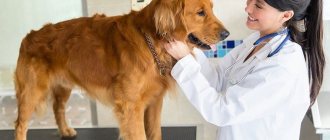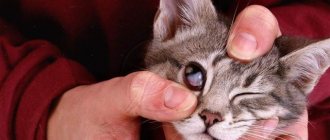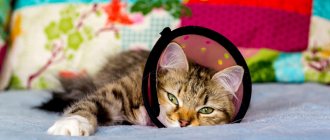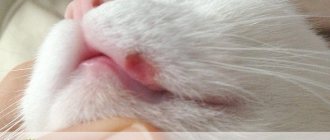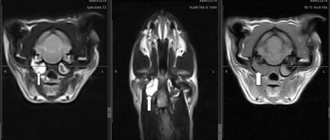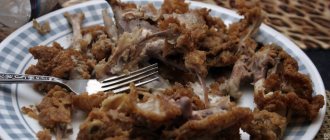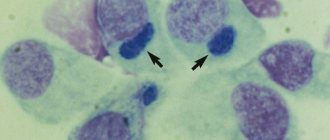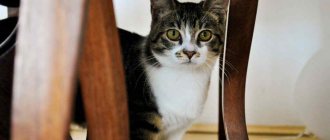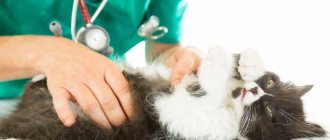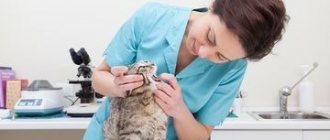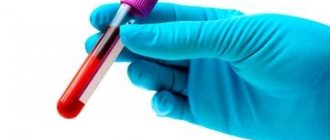What is colitis and how does it threaten the animal?
Inflammation of the mucous membranes of the colon is caused by various reasons, but equally leads to extremely unpleasant consequences. Colitis in cats causes problems with proper digestion, caused by problems with the absorption of fluid in the intestines.
As a result, this causes either constipation or intestinal upset, which negatively affects the normal digestive process. This one failure can “pull” a whole chain of nutritional disorders, which can cause very dangerous processes in the animal’s body.
Treatment of the disease must be quick and correct, and this requires accurate diagnosis and consultation in a veterinary clinic. Using “folk” methods without knowing the true cause of the disease can lead to the death of the animal.
Without treatment, colitis leads to ulceration of the mucous membrane, the appearance of purulent lesions, and the development of cancer. The longer the disease lasts, the higher the risk of complications, severe weakening of the cat and death.
Chronic colitis
- long-term, recurring, difficult to treat, extensive intestinal disorder.
It is necessary to distinguish colitis from other diseases with similar symptoms, for example, from neoplasms.
Biopsy
Often it is a tissue sample from the colon wall that allows us to identify the exact cause of colitis, especially chronic colitis. Since a biopsy requires anesthesia and surgery, this diagnostic method is used as a last resort.
Barium enema followed by x-ray
The large intestine is filled through the anus with liquid barium, which outlines its contours and allows X-rays to identify possible abnormalities (for example, tumors that prevent the passage of feces).
Types of colitis
There are several classification systems that classify colitis in cats into different types depending on specific characteristics. The disease can be roughly divided into the following types:
For the reasons that caused it:
- Bacterial, caused by infection of the cat’s body with specific bacteria.
- Viral, triggered by an inflammatory process due to a viral infection.
- Ulcerative colitis is a consequence of the presence of a corresponding disease.
- Toxic, provoked by the ingestion of various harmful substances into the body, including: drugs, household chemicals, dyes, solvents and much more.
- Ischemic, associated with an inflammatory process in the abdominal aorta.
Separately, it is necessary to highlight pseudomembranous colitis, which often appears after antibiotics. This disease may be a consequence of excessive or inept use of high doses of the drug, which provokes rapid growth of the anaerobic microorganism Clostridium difficile. This form of colitis is dangerous due to its complications, for example, the threat of perforation (perforation) of the walls of the colon.
According to the forms of colitis, it can be acute or chronic. The latter form of the disease can occur with vague symptoms, therefore it is especially dangerous for the health and even life of the cat.
The following types of disease are distinguished by location:
- Pancolitis, or general colitis, affecting the entire large intestine.
- Typhlitis is an inflammation of the mucous membranes of the cecum.
- Proctitis is inflammation of the rectum.
INTERESTING TO KNOW: How viral peritonitis in cats is treated
Colitis in cats
Colitis is an inflammation of the large intestine, accompanied by impaired digestion, immune response and intoxication of the body.
Colitis in cats can be primary and secondary, focal and diffuse. According to the nature of inflammation, they are divided into serous, catarrhal, hemorrhagic, purulent and fibrinous. According to the localization of inflammation - proctitis (inflammation of the rectal mucosa), typhlitis - inflammation of the mucous membrane of the cecum and pancolitis - inflammation of the entire section of the large intestine.
Cats of all breeds and all ages are affected.
Etiology. The causes of colitis in cats are very diverse. The main group of reasons are nutritional factors: irregular feeding, feeding of rough, spicy, irritating, poor quality food. In recent years, there has been an increase in the incidence of gastroenteritis as a result of feeding cats dry food, as well as low-quality canned food, which contains additives harmful to the animal’s body. Ingestion of heavy metal salts with food. The use of drugs that irritate the mucous membrane (salicylates, anthelmintics, resorcinol, pyrethroids, antibiotics, etc.).
Food allergy to a particular food (food allergy in animals).
Very often the causes of colitis are:
Infectious diseases: parvovirus, hepatitis, coronavirus, feline panleukopenia, leukemia, feline infectious peritonitis (salmonellosis in cats), E. coli.
Invasive diseases: worms in cats, coccidiosis in cats, giardiasis in cats, isospores.
Diseases of internal organs: gastritis in a cat, intestinal obstruction (intussusception in animals), pancreatitis in a cat, liver disease (liver disease in cats).
Malignant and benign neoplasms (oncology in cats).
Pathogenesis. The pathogenesis of colitis is very complex and largely depends on the cause of colitis in the cat. Under the influence of one or another etiological factor, an inflammatory and dystrophic process develops in the stomach and intestines. There is a violation of cavity and parietal (membrane) digestion. Congenital and acquired intestinal enzymatic deficiency increases, which accelerates the processes of lipid peroxidation. The functions of the immune system in general and the intestinal immune system in particular are disrupted, which leads to damage to the mucous membrane of the small intestine by antibodies sensitized by lymphocytes. At the same time, dysbacteriosis develops. The functions of the endocrine gastrointestinal system are upset. The motor function of the stomach and intestines is impaired. As a result, many food components, without being absorbed, follow in transit through the gastrointestinal tract. Intoxication increases in the cat's body, dehydration occurs due to diarrhea, the inflammatory process is accompanied by dysfunction of the liver, kidneys, cardiovascular system and the development of fever.
Clinical picture. In acute colitis, a clear clinical picture is observed. The first symptoms of illness in a cat may appear within a few hours after eating bad food. The cat becomes passive, hides from the owner, does not respond to calls, and lies down most of the time. There is no appetite (loss of appetite in the cat), vomiting may occur (vomiting in the cat). As the disease progresses, the cat's temperature rises, convulsions appear, and the mucous membranes turn blue. The tongue becomes covered with a gray-white coating, and bad breath appears (bad breath in a cat). Loose stools appear, mixed with blood and pus (cat diarrhea). The cat's belly is inflated like a drum. When you press on it, even from a distance, you can hear bubbling, seething sounds (bloating in a cat).
With chronic colitis, owners of their cat notice foul-smelling feces and its non-specific color.
Diagnosis . Veterinary specialists make a diagnosis of colitis in a cat taking into account the clinical symptoms of the disease and the history data collected from the animal owners. Feces will be taken for scatological examination (undigested food particles, increased amounts of organic acids, blood pigments, mucus, parasite eggs, etc.). By performing a bacterial culture, the causative agent of infectious colitis can be determined.
Clinical and biochemical blood tests are performed. A complete blood count allows you to diagnose an increase in the level of white blood cells, indicating the presence of infectious factors and inflammation. It is necessary to conduct a general blood test to detect anemia in a pet, especially if there is a high content of blood in the stool. Blood biochemistry makes it possible to evaluate the functioning of the pancreas and hepatorenal system (cat blood test).
An abdominal x-ray and ultrasound examination (ultrasound in a cat) are prescribed. Using these studies, you can confirm or refute the presence of foreign objects, as well as tumors in the cat’s digestive system.
In modern veterinary clinics, for a more complete examination of the intestines in order to exclude neoplasms and enlarged lymph nodes, colonoscopy and laparoscopy are performed.
Treatment . Treatment of colitis in cats should be aimed at:
- Restoring water-salt balance in the body.
- Relieving symptoms of intoxication.
- Normalization of stool.
To restore normal water-salt balance, rehydration therapy is carried out, including oral administration of Ringer's solution or subcutaneous administration of saline with glucose.
To remove toxins formed in the intestines, adsorbents are prescribed - activated carbon, Smecta.
For colitis of infectious etiology, antibiotics (tylosin) are used, for parasitic colitis - antiprotozoal drugs (furazolidone, metronidazole). For colitis of allergic origin, corticosteroids (prednisolone).
To restore normal intestinal microflora, probiotics are prescribed - Linex, Lactobifidin.
For chronic colitis, anti-inflammatory drugs are prescribed - sulfasalazine, azathioprine.
For colitis caused by helminths, deworming is carried out in several stages.
The cat must follow a diet for 1-2 months. In order to improve digestion, the diet should contain foods rich in fiber (bran).
Prevention. Prevention of colitis in cats should be based on preventing the causes that lead to the occurrence of colitis.
Feeding must be correct and complete. When feeding, it is recommended to alternate between dry and wet premium or super premium food. For feeding, use only high-quality feed; under no circumstances should spoiled feed be included in the diet. When feeding, mixing natural and industrially produced feed is unacceptable. When changing food, the new food must be introduced gradually, starting with a small amount. You should not give your cat spicy, smoked or salty foods, as well as sweets that are too fatty or smoked. Feed the cat 2 to 4 times during the day. Regularly use vitamin preparations with food.
In order to prevent helminthic diseases, cats must be dewormed twice a year. Regularly vaccinate against infectious diseases that exist in the region of residence.
Causes of the disease
Colitis in cats most often occurs as a result of a gastrointestinal infection. These can be viral or bacterial diseases of various types.
Also, the causes of the development of colitis can be autoimmune disorders, hereditary genetic predisposition, immunodeficiency, foreign body entry or tumor formation, including malignant, helminthiasis, poisoning with hazardous substances, poor nutrition with a lack of fiber, food allergies and even severe or frequently repeated stress .
Symptoms of colitis in cats
Symptoms and treatment of colitis in cats require special knowledge, so before trying to cope with the disease on your own, you should definitely visit a veterinarian, otherwise you can seriously harm your pet.
The main symptoms of colitis are as follows:
- Severe diarrhea, less often constipation. Frequent bowel movements are very exhausting for a cat.
- Weakness, lethargy. The animal almost does not react to external stimuli; with abdominal pain it can scream and meow pitifully.
- Tenesmus.
- Pain during bowel movements.
- The appearance of mucus and streaks of blood in the feces.
- Heavy foul odor from the cat litter box.
- Swollen, hard belly.
- Fermentation in the intestines with gurgling sounds.
- Partial prolapse of the rectum is possible due to frequent painful bowel movements.
This disease causes the cat to suffer greatly, so treatment must be as fast and high-quality as possible.
Symptoms
Acute colitis is characterized by a clear clinical picture. The first symptoms may appear within a couple of hours after the action of the provoking factor. The cat does not show activity, hides from the owner, does not respond to calls, and lies down most of the time. There is no appetite, vomiting may occur.
As the disease progresses, the animal's temperature rises, convulsions appear, and the mucous membranes turn blue. Characteristic symptoms are a dirty white coating on the tongue, a rotten smell from the mouth.
The stool is liquid, glassy, mixed with blood and pus. Defecation is frequent, and you can see that the sphincter is in a relaxed state, and the posterior rectum is gaping.
The cat's belly is inflated like a drum. When you press on it, even from a distance, bubbling, seething sounds can be heard. The animal experiences severe pain upon examination.
The chronic stage of colitis is practically asymptomatic. Only stool that smells bad and has a non-specific color of stool can cause anxiety.
Diagnostic methods
If signs of colitis are detected in a cat, or there is at least a suspicion of the presence of this disease, you should seek veterinary help. The clinic may prescribe the following types of examinations and tests:
- Ultrasound of the abdominal cavity;
- endoscopic examination;
- diagnosis of the condition of the pancreas;
- X-ray (if a foreign body is suspected);
- urine, stool and blood samples.
Depending on what type of disease and its stage is detected in the cat, the appropriate type of treatment is selected. It must be followed strictly, otherwise there is a risk of the disease becoming chronic.
Cause of colitis?
Often this question remains unclear.
Typically, the intestines contain both permanent and occasional microorganisms. Permanent
form a bioactive film that protects the mucous membrane from pathogens.
Random ones
pass through the intestines without stopping, but sometimes they remain there and begin to suppress the normal microflora, causing
dysbiosis
.
The structure of the mucous membrane is disrupted, which leads to intestinal diseases, such as sensitive digestion syndrome
or
irritable bowel syndrome
, nonspecific colitis (especially due to stress). Since there is no beneficial microflora in the intestines, there is no normal removal of intestinal contents or proper absorption of nutrients - and this leads to a weakening of the body as a whole.
Depending on the cause and degree of inflammation, colitis develops from superficial to ulcerative, and can be acute or chronic.
Treatment of the disease
Treatment of acute colitis in cats at home can lead to numerous complications, so it is impossible to do without medical help in the first stages. After diagnosis and emergency measures taken, the veterinarian will prescribe a course of medications and tell you how to treat your pet at home.
The course of treatment is always complex and symptomatic, that is, depending on the type and form of the disease. Depending on what caused it, colitis can be treated using the following means and methods:
- Antibiotics and anti-diarrhea drugs for bacterial forms of the disease.
- Antifungal drugs if a corresponding infection is detected.
- Specific antiviral agents.
- Destruction of parasites, which must be carried out in stages.
- Therapy aimed at restoring the cat’s own immunity.
- A proper balanced diet, the duration of which depends on the severity of the disease and its form.
- Surgery if severe ulcerative colitis is detected.
If treatment is carried out quickly and correctly, the chances of a complete recovery of the cat are high. If you follow all the rules, the disease may never happen again.
If treatment is incorrect, untimely, or absent altogether, this can lead, at best, to the development of a chronic form of colitis, and in the worst case scenario, to the death of a pet.
INTERESTING TO KNOW: Symptoms and treatment of hyperthyroidism in cats
Treatment
Depending on the form, type and stage of the disease, a set of medical measures is prescribed. It includes not only drug treatment, but also a special diet. It is also possible to use traditional medicine.
Medication
Since colitis is a serious disease, a comprehensive approach to it is required. The cause of the disease requires the use of adequate measures:
Folk remedies are more gentle than medications, so they are used in combination with medications or at the very initial stage of the disease. You should also consult your veterinarian before using them. For diarrhea and inflammation, tinctures of mint and parsley, dried fruits that help stimulate intestinal function (figs and prunes), and foods high in fiber help.
Diet
If you have a disease, you need to choose a gentle diet. The optimal solution would be industrial holistic feed or a special veterinary line of premium products.
Preventive actions
Sometimes owners become the cause of their pet's illnesses - through an oversight, due to neglect of basic hygiene, or, oddly enough, due to an excess of love. In the latter case, the disease can be provoked by feeding the cat from the owner's table.
Some animals beg for a handout so diligently and tenderly that the hearts of the owners cannot stand it, and they give the purr a treat, believing that human food will not harm it. But most often cats ask for exactly what is categorically unacceptable to them, for example, smoked sausage or fish, fried meat. Some people love spicy cheese, butter, there are even connoisseurs of pickled cucumbers, rich borscht or sweets.
In microdoses, such indulgence can still be tolerated occasionally, but regular feeding of “human” food can quickly lead to digestive disorders and cause colitis. To prevent this from happening, cats can only be given properly selected, balanced food for animals of their age, preferably chosen by a veterinarian.
The second aspect is the environment in the house. Dirty bowls, lack of clean drinking water, irregular use of anthelmintics and stress can cause the development of colitis. Avoiding this is quite simple - just regularly expel parasites, keep the cat's bowls and trays clean, especially if there are several cats in the house, change drinking water every day and do not give it untreated or unboiled.
It is highly advisable to have your pet examined at least once every six months in a good veterinary clinic. And of course, if signs of illness appear, do not self-medicate, but take the mustachioed handsome man to an experienced doctor.
